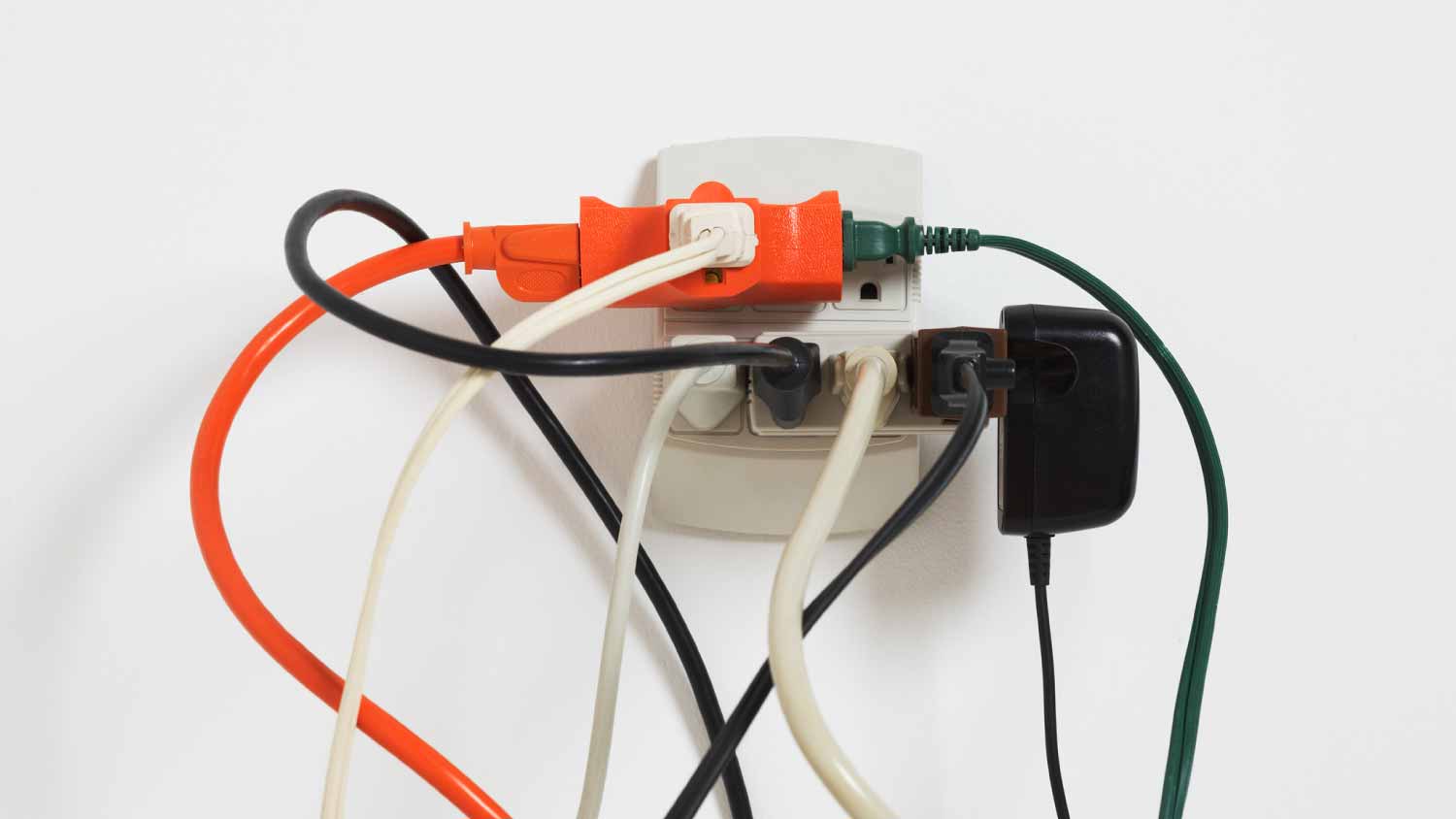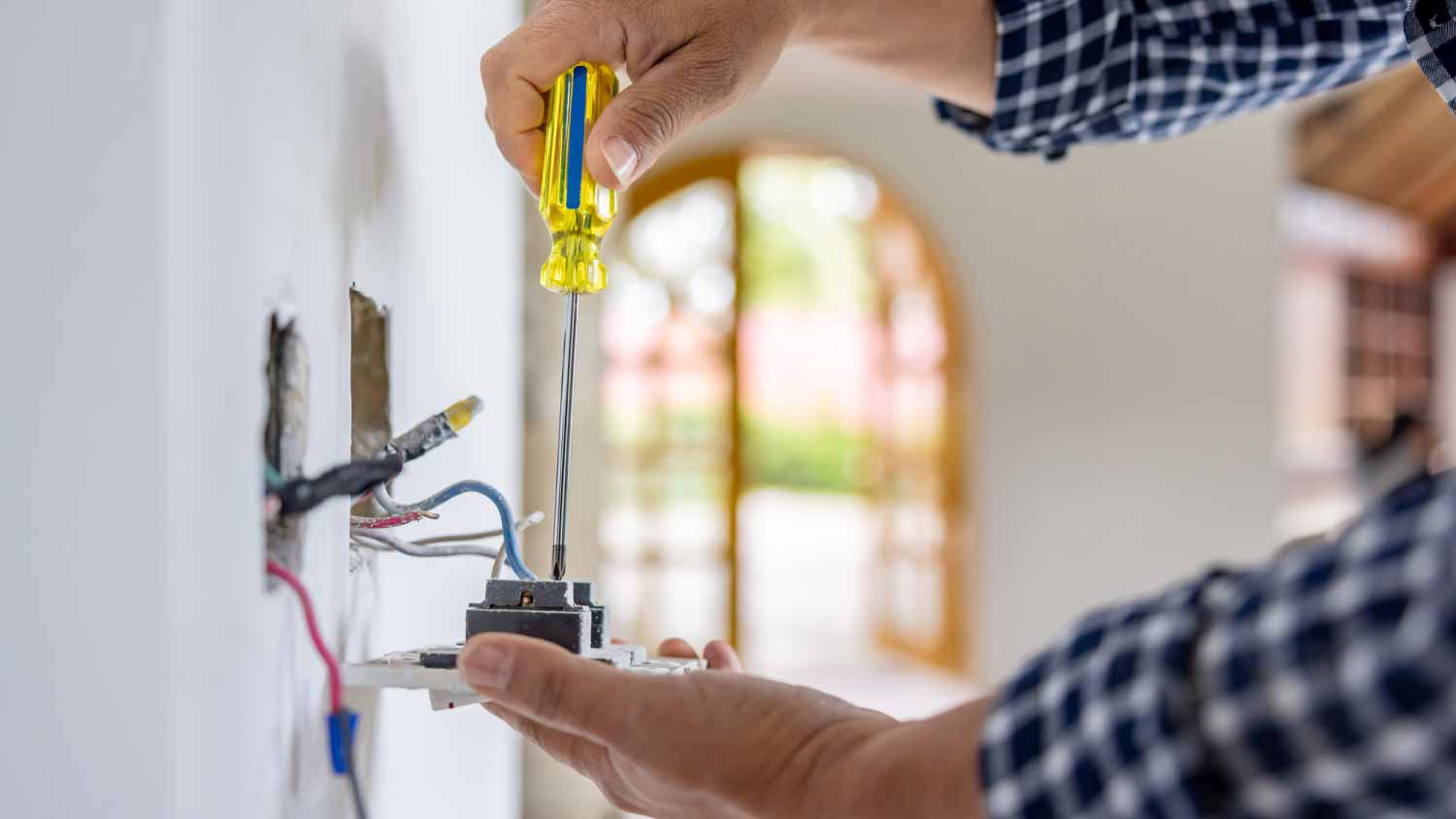
Installing a dedicated line in your home or garage is fairly straightforward, but may have a wide range of cost-affecting factors, like materials, labor, and necessary permits.
Find the answers to your burning questions about outlet problems


An outlet that smells like burning indicates an electrical problem with the outlet or wiring and may pose a fire risk.
Always turn off the breaker and unplug any devices from an outlet with a burning smell.
A licensed electrician can safely identify and fix the cause of the burning smell.
One thing that should not happen is an outlet that smells like burning. If you’ve noticed a singed odor near one of your outlets, it’s a sure sign that you need to pay attention. Electrical problems are the main cause of an outlet that smells like a campfire. But one thing’s for sure: No matter what causes it, this is a safety issue. Before tracking down or trying to fix the cause of the burning smell, turn off the breaker to the outlet and unplug whatever is using it. Electrical work can be dangerous and can be a serious fire risk if you don’t know what you’re doing. Unless you have electrical experience, call a local electrician to find a solution.

Outlets are designed to handle a set amount of power, so plugging in too many devices (or high-wattage devices) that draw too much power can overload the circuit. When the circuit overloads, the outlet may overheat, leading to a burning smell.
Avoid overloading outlets with outlet splitters. Check the maximum output of the outlet, and move high-wattage devices to outlets rated for higher output or to a GFCI outlet, which will cut power to the outlet when an overload is detected.
Exposed wiring in or behind the outlet may come into contact with metal or other materials, singeing them and emitting a smoky scent. Exposed wiring is a significant fire hazard, as it can generate sparks or come into contact with flammable material within your walls.
The fix for an exposed wire can be as simple as wrapping the wire with electrical tape or using a wire connector cap. Exposed wiring should be handled with caution, so call an electrician if you don’t have experience with electrical work. A pro will be able to complete the repair safely while minimizing fire risk.

When your outlet has damaged components, you may smell a burning odor or notice that the outlet stops working. Damaged outlet components are especially common in older models and may be a sign that it has reached the end of its lifespan.
Fully replacing a damaged outlet is the safest and most effective way to handle the problem. Trying to troubleshoot may lead to other electrical problems, so installing a new outlet is your best bet. The cost to install an outlet is worth the peace of mind of knowing you’re protected from electrical problems and fire risks.
Connections can be compromised from wear and tear and the loose wiring connections in the outlet can generate heat. An improperly installed outlet may also have poor connections that degrade over time, leading to overheating and a burning smell.
Tighten anything wonky using wire connector caps or reinstall the outlet altogether. As with all electrical work, this can be a dangerous DIY, so call a pro if you aren’t comfortable with this kind of electrical repair.
In some cases, the burning smell may originate from whatever is plugged rather than the outlet itself. Devices or appliances with frayed or exposed wiring, damaged plugs, or build-up of dirt or grime around the plug can be attributed to this worrisome smell.
Immediately unplug anything that emits a burning odor. Inspect the wiring and plug to look for visible damage. Discontinue using the device or appliance and replace it with a new one or repair the damage before using it again.
Never ignore a burning smell coming from your outlet—it can be a sign of a serious electrical problem and a fire risk that can put your home and safety in jeopardy. Unless you have experience troubleshooting and repairing electrical problems, call a professional electrician. Improperly performed DIY electrical work runs the risk of serious injury or even a house fire.
A qualified electrician can answer all your questions about repairing outlets, track down the source of the burning smell, and repair the issue in compliance with codes and regulations.
Ensuring your home’s electrical system is well maintained is the best way to prevent burning smells from electrical problems. If your home is older and the electrical system hasn’t been maintained, call an electrician to perform an inspection and identify any existing or potential problems.
In addition, avoid overloading outlets with too many devices or anything that has higher wattage than the outlet can supply. Periodically inspect your outlets to ensure everything is in working order and nothing looks singed, melted, or discolored. Most importantly, address any problems as soon as you notice them—the longer you wait to fix an electrical problem, the more your home and safety are at risk.
Most of the 5 start review on other websites are fake. Check many of the 5 star reviews and see they have no friends or followers. This means they are FAKE REVIEWS. They have people place fake reviews to raise their ratings I can personally tell you these people did a kitchen remodel for me...
This was the first time I worked with them. I plan to use them as my electrical service for 3 rental houses. They were ontime, online, and on the job. Just what I need for remote servicing.
Golden Electric is Fantastic! They recently installed a Tesla car charger at my home, and the entire process was super easy. I called Robert and got a quote right away, and we set up the installation quickly. They took care of everything like the permits and inspections with no problems. ...
PCE did the electrical for an attached ADU project. They delivered and provided quality work. Inspection passed with no issues.
This is the right person to hire for all your electrical needs ! I had quite a few things that needed repair or replaced, some major and minor projects, and he put 110% into it. I would hire him for all my electrical needs. He sure knows his stuff ! Rashid Thank You again !!
Mr. Frank Wilson (All Spark Electric) has provided quality in- home electrical work for our families homes in the SJ Rose-Garden and Old Quad Sana Clara area for years. Frank's work ethic is impeccable and he's an expert in his field. He has done everything from an entire re-wire of...
They came on time and charged a reasonable price.
Very nice work. The workers came and did a great job. Julian was very helpful in my choosing of what type of wood I should get. Would use Meza's Fence again.
High work ethic and attention to detail, reliable and quality workmanship. I found a new "go to" electrician for all my needs. I would highly recommend TK Electric (Tami) to anyone who asks for a recommendation.
I had a very positive experience with Imperial Solar, hence my reason for getting on Home Advisory to write a review about them where I originally located them. Imperial Solar truly is the best at what they do (Sales/Design/Installation) and they provide outstanding customer service. And this...
From average costs to expert advice, get all the answers you need to get your job done.

Installing a dedicated line in your home or garage is fairly straightforward, but may have a wide range of cost-affecting factors, like materials, labor, and necessary permits.

Before you hire a licensed electrical contractor, you should learn the cost to run electric from the road to your house so you can budget for the project.

Keep pool-side dreams from getting short-circuited by being aware of pool electrical installation costs and how they can affect your overall budget.

Is it acceptable to have an electrical panel in a bathroom? Keep reading to find out the best location for this essential feature.

Is your home costing you more money than it should be? You can take steps to save money throughout your home to keep it where it should be—your wallet.

Wondering who to hire for electrical work on home additions? Compare electricians and electrical contractors to see how pros get the job done.